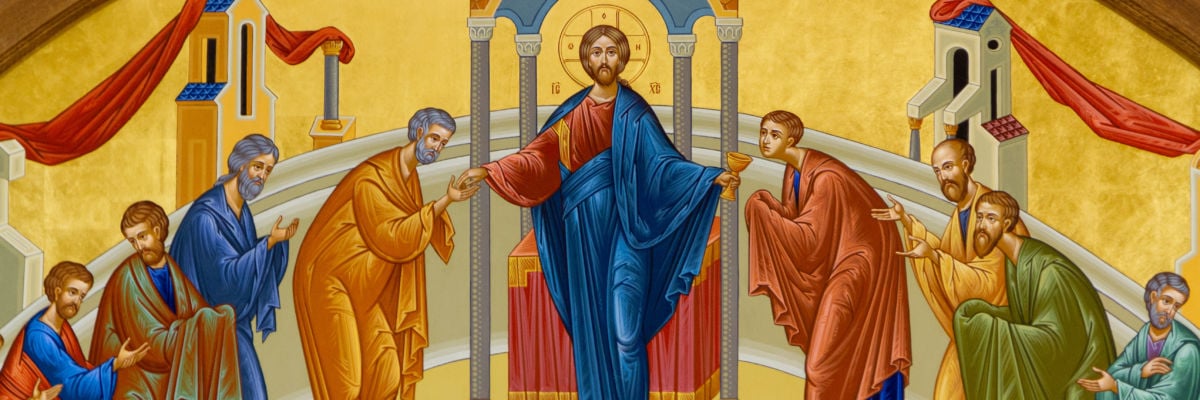
On Monday and Wednesday, we considered two of the most common objections to the Catholic understanding of the Real Presence of Christ in the Eucharist from John 6. Now we are going to consider what I believe to be the most common objection of all. John 6:63 is singled out by Protestant apologists and many quasi-Christian sects to counter much of what we have shown thus far.
After seeing the Jews and the disciples struggling with the radical teaching, our Lord says to the disciples and to us: “It is the spirit that gives life, the flesh is of no avail; the words that I have spoken to you are Spirit and life.” Many Protestants claim Jesus meant to emphasize here that he is speaking of his flesh and blood in the spiritual, or perhaps symbolic, sense only. See? He’s not giving us his flesh to eat because he plainly says, “the flesh is of no avail.”
How do we respond?
First, if Jesus was clearing up the point here, then one is forced to wonder why many of the disciples left him immediately thereafter. As we discussed in the previous article, they obviously believed our Lord meant what he said. If he really meant to clear things up here and say, “I was only speaking symbolically, folks—I only meant that you have to believe in me and follow me,” then why would they have left? They already believed in him and were following him!
Second, Jesus did not say, “My flesh is of no avail.” He said, “The flesh is of no avail.” There is a huge difference between the two. No one would have believed he meant my flesh avails nothing because he just spent a good portion of this same discourse telling us that his flesh would be “given for the life of the world” in John 6:51, even confirming his intent in verses 50-58. So what was he referring to?
The flesh is a New Testament term often used to describe human nature apart from God’s grace. For example, Christ said to the apostles in the Garden of Gethsemane, “Watch and pray that you may not enter into temptation; the spirit indeed is willing, but the flesh is weak” (Mark 14:38). According to St. Paul, if we are in “the flesh,” we are “hostile to God” and “cannot please God” (Rom. 8:1-14). In I Cor. 2:14, Paul tells us, “The unspiritual man does not receive the gifts of the Spirit of God, for they are folly to him, and he is not able to understand them because they are spiritually discerned.” And in I Cor. 3:1, he goes on to say, “But I, brethren, could not address you as spiritual men, but as men of the flesh, as babes in Christ.”
Supernatural grace is required to believe the radical declaration of Christ concerning the Eucharist. As Jesus himself said both before and after this “hard saying”—in both verse 44 and in verse 65—“No one can come to me unless the Father who sent me draw him.” In other words, belief in the Eucharist is a gift of grace. The natural mind—or the one who is in “the flesh”—will never be able to understand and accept this great Christian truth.
Third, Jesus also said, “It is the spirit that gives life, the flesh is of no avail,” because he wanted to ensure his words would not be taken as an endorsement of cannibalism. It is the Holy Spirit that will accomplish the miracle of Christ being able to ascend into heaven bodily while being able simultaneously to distribute his body and blood in the Eucharist for the life of the world. A human body, even a perfect one, apart from the power of the Spirit, could not accomplish this.
Fourth, we Christians don’t want to fall into the trap of believing that because Christ says his words are “spirit and life,” or “spiritual,” they cannot involve material substance. This will get you into all sorts of trouble, biblically speaking. For example, when speaking of the resurrection of the body, St. Paul wrote: “It is sown a physical body, it is raised a spiritual body” (I Cor. 15:44). Does this mean we will not have a physical body in the resurrection? Of course not! Jesus made that clear after his own resurrection in Luke 24:39:
See my hands and my feet, that it is I myself; handle me, and see; for a spirit has not flesh and bones as you see that I have.
The resurrected body is spiritual, and indeed, St. Paul refers to strong Christians as “spiritual” in I Cor. 3:1-2. Inasmuch as a Christian is controlled by the Spirit of God, he is “spiritual.” This, in no way means absence of the material. That would be more Gnostic than Christian in understanding.
I have found the confusion here is often based upon a failure to properly distinguish between “spiritual” or “spirit” being used as an adjective versus “spirit” used as a noun. When “spirit” is used as a noun—for example, “God is spirit” in John 4:24, or angels are “messenger spirits” in Heb. 1:14—Scripture is presenting that which is not material. When used as an adjective denoting “spiritual,” however, it is referring to that which is controlled, or led, by the Spirit. In John 6:63, “spirit” is used as an adjective to describe Jesus’ words, not as a noun. Christ’s words, he says, “are spirit and life.” In other words, They are spiritual. This in no way means they are representing something that is devoid of materiality.
I think it safe to conclude that Jesus words, “It is the spirit that gives life, the flesh is of no avail” have essentially a two-fold meaning: it is only the Spirit that can accomplish the miracle of the Eucharist, and it is only the Spirit that can empower us to believe in the miracle. If you are relying on the power of the flesh, you aren’t going to see it!



